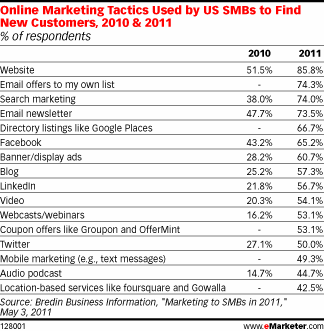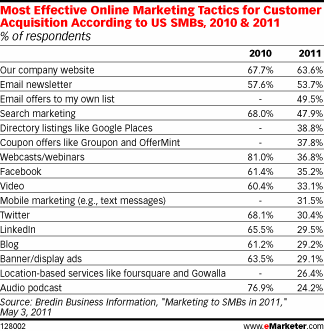Something I come across all the time is business owners and managers questioning the effectiveness of blogging. Most successful people in the business world are aware of the power of blogging. They have either heard of a successful blog or perhaps are even successful business bloggers themselves.
Where the frustration comes for most business managers is defining how a blog can work for them. If a business manager doesn’t quite have their arms completely around blogging there is frustration. If that business manager starts a blog, but isn’t entirely sure how to share produce effective blog posts they are setting themselves up for frustration with blogging.
Small Business Blogging 2011
A recen study highlighted on eMarketer seems to point to the frustration small business owners are having in 2011 with their blogging efforts.
Here are two charts from the study: For Small Business Marketers, Are Fewer Channels Better?
Small Business Blog Usage 2011
Blog Frustration 2011
The folks at eMarketer take things to a different interpretation from what I took it as, but that’s ok. I see this information as saying small business owners seem to know they need a blog yet aren’t entirely happy with the results they’re currently seeing.
And that’s the reason I started Ghost Blog Writers.
GBW Interpretation
As you can see in the first graph, it appears the number of small businesses using a blog as a marketing tool has more than doubled in the last year. This means small business owners and managers have seen that 57% of business have acquired a customer via their blog. Small business owners in 2011 realize that businesses that blog get 55% more traffic. Small business owners know that in order to keep up they need to blog because 43% of companies will be blogging by next year.
All of these things are reasons why the interest in blogging has doubled in the last year with small business owners. People are smart and they know something is there, but when we move to the second charts we start seeing some frustration…
Chart 2…
Chart 2 has some disappointing news for blogs. It actually has some disappointing news for all marketing channels listed.
Small business owners are not happy with the effectiveness of their blogging efforts (they aren’t happy with the effectiveness of a few channels, but we’ll stick to blogging).
I can’t speak for every small business, but I can share a few things I see in the blogging world that can lead to frustration with blogging efforts.
1. Frequency
Most bloggers struggle with frequency. Blogging is more difficult than most people realize. It takes effort to research material for effective blog posts. It takes understanding of effective writing for people and effective writing for search engines to be successful with blogging. It takes experimentation and a constant drive to improve to be successful with blogging. Having a successful blog takes work and all of the work can get in the way of posting on a regular basis.
Yet that’s what readers demand of blogs. Readers want consistent information and in return they’re willing to give their business to companies that show the initiative to provide information.
The first key I see to avoid frustration with blogging is to understand the importance of frequency. Understand the resources it will take to maintain an effective frequency and determine if your business can handle the work load in house or if outside resources are necessary. If your business isn’t putting in the effort and investment your competitors will.
2. Idea Generation
Coming up with ideas for posts is another area where I see small businesses and large business struggle with blogging. Companies often struggle with understanding what their customers want from a blog. It’s strange because these same businesses are really good at providing products and services for their customers. These businesses are really in tune with what their customers want, but when it comes to blogging I see businesses missing the mark – not all businesses, but most it seems.
For successful blogging it takes some good understanding and research up front to see what your customers is searching for as it relates to your industry and business. Customers are asking questions and a blog is a great way to answer.
Often it surprises business managers when they dig a little into the questions their customers are asking. Providing the answer can even seem simple to the business owner yet valuable for the customer.
This is where blogs can win.
3. Return on Investment Expectations
Blogging is a long-term business strategy.
Blogging is not PPC. You will not see instant feedback from blogging like you will with advertisements. It doesn’t work that way. Yet even though blogging will not provide instant feedback there are far greater benefits in the long run.
Blogging is a strategy for building ever increasing assets your company can utilize and benefit from over the long run. As you publish more blog posts you will continue to see traffic and potential sales leads from new posts and existing posts. A blog post won’t disappear. People will continue discovering it via search and social.
It takes time to build a substantial catalog of blog posts. It seems from the charts above that perhaps small businesses expect more from blogs and expect it sooner than is really possible.
Summary
Businesses are increasing their blogging efforts.
Yet while businesses are increasing their blogging efforts there is a disappointment in the results. This is troubling for me and it’s something I want to work on with businesses.
What are the frustrations you are having with you blog.
Share your thoughts and let’s discuss.


